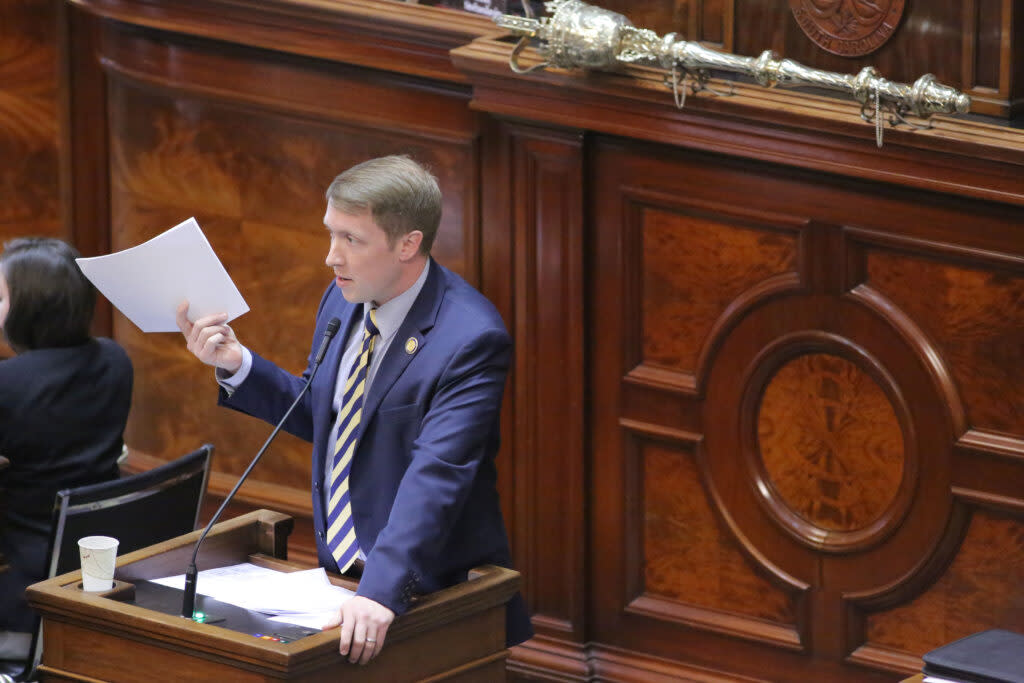SC’s uber-conservative GOP caucus picks new leaders

- Oops!Something went wrong.Please try again later.
- Oops!Something went wrong.Please try again later.
- Oops!Something went wrong.Please try again later.
Rep. Jordan Pace during the budget debate in the S.C House on Tuesday, March 12, 2024 in Columbia. (Travis Bell/STATEHOUSE CAROLINA/Special to the SC Daily Gazette)
A freshman legislator from the Lowcountry is the new leader of South Carolina’s uber-conservative House Freedom Caucus.
Rep. Jordan Pace, R-Goose Creek, was elected chairman of the caucus that launched in 2022, replacing Rep. Adam Morgan of Greenville County, who ran unsuccessfully for Congress.
“I’m deeply energized by the gains that we’ve made,” Pace said Friday, when the caucus election results were announced. “I think we have really, really good momentum.”
He was referring to shifting debates further to the right over the last two years, rather than specific legislation.
The 2022 elections gave Republicans a beyond-supermajority in the House, with 88 of the chamber’s 124 seats. But House debates often get bogged down in a GOP civil war between Republicans in the majority and the hardline faction.
House Majority Leader Davey Hiott discounted Pace’s assessment.
“The numbers don’t prove that,” the Travelers Rest Republican said of Freedom Caucus gains. “Our majority is just as strong as it was two years ago.”
Other than Pace, the Freedom Caucus’ other leadership remains from the Upstate, where the majority of members live.
Reps. Josiah Magnuson of Spartanburg County and April Cromer of Anderson County were elected co-vice chairs of the caucus. Magnuson, R-Fingerville, previously served as secretary, a role the caucus is dropping.
All 13 members of the caucus seeking re-election participated in last week’s vote, Pace said. The leadership change took effect immediately. The caucus will vote again in two years.
Four Freedom Caucus members did not run for re-election to the state House, including Morgan, who last month lost his bid to oust U.S. Rep. William Timmons in the 4th District.
Rep. Stewart Jones of Laurens, another founding caucus member, ran unsuccessfully for the 3rd District seat left open by the retirement of U.S. Rep. Jeff Duncan. Jones placed third in the seven-way GOP primary.
The two other members exiting the chamber are Reps. David O’Neal of Tega Cay and Ashely Trantham of Pelzer, who didn’t seek higher office.
Despite the loss of four, the caucus will likely end up with 20 members after the November election, Pace said.
They may end up with slightly more than the number they started with in 2022.
Pace was among just two Freedom Caucus members who didn’t face a primary opponent. He also has no Democratic opposition in November.
The House Majority Caucus tried to shrink the Freedom Caucus’ ranks in the June primary, while the Freedom Caucus sought to expand their numbers by working to help challengers oust GOP incumbents. Ultimately, all Freedom Caucus members defeated their challengers, while a few Republicans got ousted by challengers expected to join the GOP subset.
That’s exactly what got the Freedom Caucus booted from the majority after the November 2022 elections, when most caucus members refused to sign a new pledge not to work for GOP challengers. A couple of Republicans left the Freedom Caucus amid the kerfuffle to continue meeting with the majority.
Despite the caucus’ combative relationship with House leaders, Pace said the Freedom Caucus is open to working with anyone.
“We get called a lot of names, but at the end of the day our platform is the Republican party platform,” Pace said.
The focus of the caucus is conservative policy, not trying to “poke anyone in the eye,” he said.
Hiott scoffed at that too, saying video of floor debates show differently.
The Freedom Caucus celebrated big wins on the last day of the regular session May 9, as members’ procedural objections in the final hour managed to kill several bills advocated by GOP leaders in both chambers. That included proposals to streamline municipal elections and merge six agencies in an overhaul of the public health system.
Gov. Henry McMaster urged legislators to resurrect the health care bill in a special session. But that debate will have to start all over next year.

